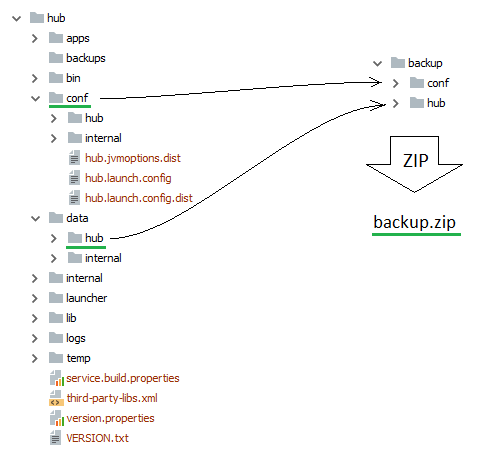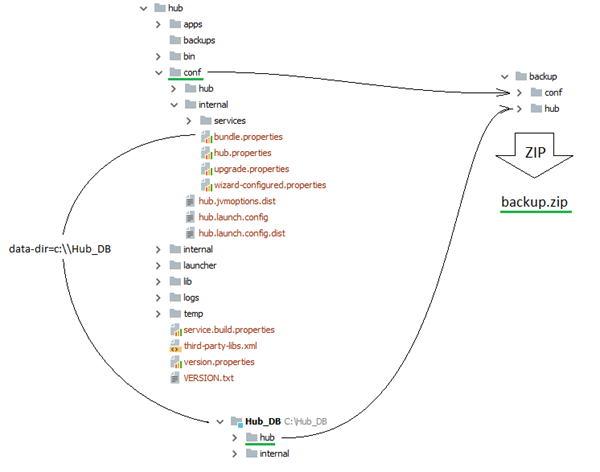Restore a ZIP Installation
If you experience problems with your Hub installation, you may need to restore to the most recent working version. Common scenarios that require that you restore an installation include:
You are unable to upgrade your installation successfully and need to restore the previously-installed version.
The database of your installation breaks and you need to restore the current version from a backup copy of your database.
In both cases, you can restore your installation using a valid backup of your Hub database. If your backups are out of date, you can attempt to restore your installation using valid copies of your configuration and data files. Restoration is only possible if you have either a valid backup or a copy of your database that is not corrupted.
You should test this procedure on a regular basis to make sure you can use your backup files to restore your installation after an outage or attack.
Prerequisites
Before you begin, make sure you have a backup copy of the database that you want to restore. Note the location of the backup copy so you are sure to select the correct file during this procedure.
If you're rolling back to the previous installation version after an unsuccessful upgrade, use the backup that you created prior to installation. If you ignored this prerequisite, locate a backup file that corresponds with the version of your previous installation.
If you're attempting to restore the current installation, locate an archived backup file in the directory that is set as the Backup location that corresponds with the current version of your installation.
Restore an Installation from a Backup Copy of Your Database
To restore your database to the current or previous version, you need to reinstall Hub and use the backup as the Upgrade Source during installation.
When you restore to a previous version of Hub, use a backup that corresponds to the version of the product that you want to restore.
To restore your database from a backup:
Stop the Hub service. For detailed instructions, seeStop and Start the Hub Service.
Remove the
<hub_home>directory. The<hub_home>directory is the location where the ZIP distribution was unpacked during installation. If the backup copy of the database that you want to use to restore your installation is located in this directory, move it to another location.Download and install a Hub build that is the same version or later than the version of your database backup. For detailed instructions, seeZIP Installation.
In the Configuration Wizard, select the Upgrade option.
On the Select Upgrade Source page, select your backup as the Upgrade Source and click the Next button.
- Confirm or change the locations where Hub stores product data. When done, click the Next button.
Hub starts with the data from the backup file.
Restore the Current Version Without a Database Backup
There are a few cases where you are unable to restore you installation from backup.
Your backup files are missing or out of date.
The files on your server became corrupted and are unusable.
You may also want to follow this procedure when, for example, you were able to recover your data following a server crash and there is information that was recorded in Hub that is not in your most recent backup files.
You can attempt to restore the current version of your installation using valid copies of your configuration and data files. This restoration procedure is only successful when your configuration and data files are not corrupted. You can restore to an earlier version of Hub only when you have copies of files that have never been used to start a later version of the product.
To restore your database without a backup:
Locate the most recent copies of your
dataandconfdirectories. By default, these directories are stored in the location where the ZIP distribution was unpacked during installation.
Note that an administrator may have changed the location where Hub stores these files. The path to the current location of the database is stored in thedata-dirparameter in the<hub_home>/conf/internal/bundle.propertiesfile. You may also use copies of these directories that are stored in another location.- Copy the
confdirectory and thehubsubdirectory from thedatafolder. Paste them into a single, empty directory.If your database is stored in the default location, you can copy these files from the location shown in the following image and structure the content of the new directory as shown on the right.

If your database is stored in another location, reference the
bundle.propertiesfile to locate the data files and recreate the structure as shown on the right.
Compress the contents of the new directory into an archive file. You can use any filename.
Make sure that the service user account you use to run Hub has full access to this directory.
Stop the Hub service. For detailed instructions, seeStop and Start the Hub Service.
Install a Hub build that is the same version or later than the version of your database.
In the Configuration Wizard, select the Upgrade option.
On the Select Upgrade Source page, select the directory that contains your
dataandconfdirectories as the Upgrade Source and click the Next button. Alternatively, you can use a.ziportar.gzarchive file that contains the content of these directories.- Confirm or change the locations where Hub stores product data. When done, click the Next button.
Hub starts with the data from the configuration and data files.